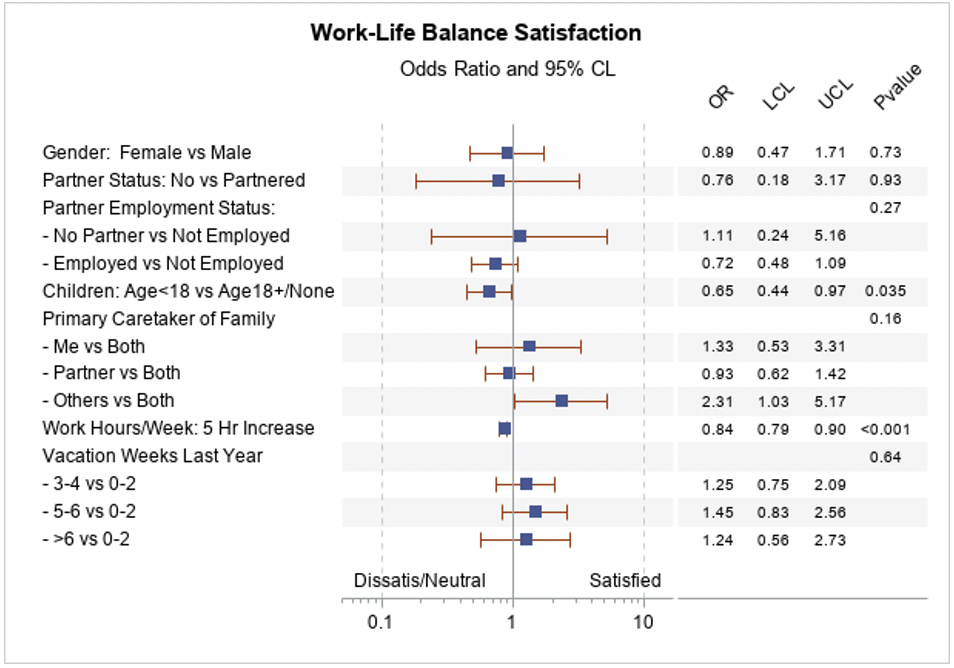Back
Poster, Podium & Video Sessions
Moderated Poster
MP13: Health Services Research: Practice Patterns, Quality of Life and Shared Decision Making I
MP13-10: Can you have it all? Parenting in Urology and Work-Life Balance Satisfaction
Friday, May 13, 2022
2:45 PM – 4:00 PM
Location: Room 228
Catherine S. Nam*, Stephanie Daignault-Newton, Lindsey A. Herrel, Kate H. Kraft, Ann Arbor, MI

Catherine Nam, MD (she/her/hers)
Northwestern
Poster Presenter(s)
Introduction: With concerns of urology workforce shortage, burnout is a constant threat. We evaluate the association between work-life balance satisfaction for practicing urologists who have children under the age of 18 years compared to those who do not have children or have children 18 years or older.
Methods: We analyzed 663 respondents who answered both 2018 and 2019 American Urological Association (AUA) census data with post stratification adjustment methods. We then evaluated association between work-life balance satisfaction based on their partner status, employment status of their partner, child status, primary responsible party for family responsibilities, total work hours per week, and total vacation weeks per year.
Results: Of 663 respondents, 77 (9.0%) were female and 586 (91%) were male. Female urologists have a statistically significant difference in having an employed or self-employed domestic partner or spouse (79.5 +/- 9%) compared to male urologists (48.9 +/- 3.9%) (p < 0.0001). Male urologists have a statistically significant difference in having their partner be the primary responsible party for family responsibilities (50.3 +/- 3.9%) compared to females (26.5 +/- 10.2%) (p < 0.0001). There is no statistically significant difference in partner status, mean total hours per week, or mean total vacation weeks per year between male and female urologists.
When evaluating for association between these factors and work-life balance satisfaction, urologists with children less than 18 years old have odds ratio of 0.655 of reporting work-life balance satisfaction than those with older or no children (p = 0.035). For every five additional hours worked per week, there is 0.844 odds ratio of reporting work-life balance (p < 0.0001). However, there are no statistically significant associations between work-life balance satisfaction and gender, employment status of their partner, primary responsible party for family responsibilities, and total weeks of vacation per year.
Conclusions: According to recent AUA census data having children under the age of 18 years old is statistically significantly associated with lower work-life balance satisfaction. This highlights opportunities to support young parents, both male and female, in the workplace to prevent burnout and maximize well-being among urologists.
Source of Funding: None

Methods: We analyzed 663 respondents who answered both 2018 and 2019 American Urological Association (AUA) census data with post stratification adjustment methods. We then evaluated association between work-life balance satisfaction based on their partner status, employment status of their partner, child status, primary responsible party for family responsibilities, total work hours per week, and total vacation weeks per year.
Results: Of 663 respondents, 77 (9.0%) were female and 586 (91%) were male. Female urologists have a statistically significant difference in having an employed or self-employed domestic partner or spouse (79.5 +/- 9%) compared to male urologists (48.9 +/- 3.9%) (p < 0.0001). Male urologists have a statistically significant difference in having their partner be the primary responsible party for family responsibilities (50.3 +/- 3.9%) compared to females (26.5 +/- 10.2%) (p < 0.0001). There is no statistically significant difference in partner status, mean total hours per week, or mean total vacation weeks per year between male and female urologists.
When evaluating for association between these factors and work-life balance satisfaction, urologists with children less than 18 years old have odds ratio of 0.655 of reporting work-life balance satisfaction than those with older or no children (p = 0.035). For every five additional hours worked per week, there is 0.844 odds ratio of reporting work-life balance (p < 0.0001). However, there are no statistically significant associations between work-life balance satisfaction and gender, employment status of their partner, primary responsible party for family responsibilities, and total weeks of vacation per year.
Conclusions: According to recent AUA census data having children under the age of 18 years old is statistically significantly associated with lower work-life balance satisfaction. This highlights opportunities to support young parents, both male and female, in the workplace to prevent burnout and maximize well-being among urologists.
Source of Funding: None


.jpg)
.jpg)